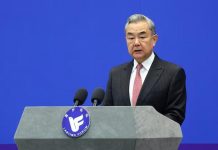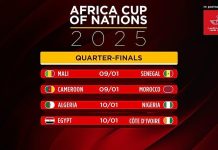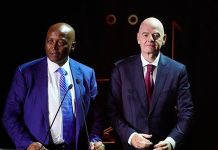Africa-Press – Lesotho. World leaders who gathered in Switzerland to discuss peace for Ukraine on Sunday stressed the importance of compliance with the UN Charter.
The meeting sent a “strong signal” to Russian President Vladimir Putin, said Dutch Prime Minister Mark Rutte at the plenary session of the two-day peace summit in Switzerland’s Burgenstock.
“Many around this table have said that Russia should have been here today. And I fully agree. You should have been here. We need Russia to participate,” he added.
Rutte stressed that peace “is only possible if Russia abides by the basic rules and values which apply to all of us. Let us not forget, this is why we together founded the United Nations in 1945.”
Sovereignty must be ‘respected’
Greek Prime Minister Kyriakos Mitsotakis stressed “the importance of compliance with international humanitarian law and international human rights law.”
“This is an absolute priority not just in Ukraine, but in Gaza, in Sudan,” Mitsotakis noted. “We must above all, prioritize the protection of civilian population.”
He added that protecting the Ukrainian infrastructure “is absolutely critical in maintaining the level of Ukrainian exports,” to maintain global food prices.
The meeting in Switzerland is a way to show commitment to a “rules-based international order, to confirm the primacy of the UN Charter, to send a very clear message that sovereignty must be respected.”
Mitsotakis emphasized that just and lasting peace should not equal “Ukrainian capitalization.”
Defending ‘system of rules’
Italy’s Prime Minister Giorgia Meloni said that “defending Ukraine means defending that system of rules that holds the international community together, and protects every nation.”
She reiterated that peace does not mean surrendering, despite Putin’s latest peace proposal, and that “confusing peace with subjugation would set a dangerous precedent for everyone.”
Meloni, who has recently hosted the three-day G7 summit in her country, hailed the outcome and the agreement “to make approximately $50 billion of additional financial support available to give by the end of the year, leveraging the extraordinary revenues of the immobilized Russian sovereign assets.”
Ukraine has ‘same rights with rest of us’
Ireland’s Prime Minister Simon Harris, for his part, underlined that Ukraine holds “the same rights to its territorial integrity and sovereignty as the rest of us.”
“If we do not insist upon it for Ukraine, we cannot expect it for ourselves,” Harris said. “If we reverse to a global system where the organizing principle is might,… the independence we enjoy today as free nations will be at serious risk. This is an existential issue.”
He also mentioned “the humanitarian catastrophe” in Gaza, urging for an immediate cease-fire.
“We must see an end to the violence, and hindered and unimpeded humanitarian aid must enter, and all hostages must be released,” he said.
The prime minister noted that states “must be consistent” in their approach to end conflict and to bring peace as human suffering continues in countries like Sudan, Syria, and Congo.
Jonas Gahr Store, the prime minister of Norway, ensured that his country would be onboard in the “next phase” following the peace summit.
“I feel just more inspired that we will succeed on that road,” he said.
Path to peace ‘narrow, complicated’
Vice Prime Minister of Sweden Ebba Busch recalled how Russia’s war made them search for reassurance from NATO.
“Russia’s full-scale invasion of Ukraine led us to reassess our own policy of two centuries and seek together with Finland the reassurance of membership in NATO.” Busch said, and added: “That’s a major change for a country as Sweden. But a necessary one and a direct result of Russia’s illegal, unprovoked, and indefensible war of aggression.”
Stressing that the path to peace looks like a “narrow and complicated” one, and said: “Putin can be the bearer of peace tomorrow. Bring the children back home to Ukraine. Call back the troops to Russia.”
Rosemary DiCarlo, the under-secretary-general of the UN who joined as an observer at the summit, underscored: “Russia’s invasion of Ukraine violates the United Nations Charter and international law, and has caused immense suffering to the people of Ukraine.”
“Further, UN General Assembly resolutions have supported the sovereignty, independence, unity, and territorial integrity of Ukraine within its internationally recognized borders,” DiCarlo said, recalling that many voices during this meeting have stressed the need to adhere to the principles of the UN Charter.
“These principles are as valid today as they were in 1945,” she said.
Russia’s peace vision not ‘reasonable’
Jake Sullivan, the national security advisor of the US, said the summit defined the core character, the core foundation of how just peace looks like.
“What is most interesting in watching these last two days is the split-screen of this weekend with what we heard from President Putin as he laid out his vision for peace a couple of days ago, where he said, not only does Ukraine have to give up the territory Russia currently occupies, but Ukraine has to leave additional sovereign Ukrainian territory before Russia will negotiate,” Sullivan said. “And Ukraine must disarm so that it is vulnerable to future Russian aggression down the road.”
“No responsible nation can say that is a reasonable basis for peace,” he said, adding that it “defies” the UN Charter, basic morality, and basic common sense.
For More News And Analysis About Lesotho Follow Africa-Press






